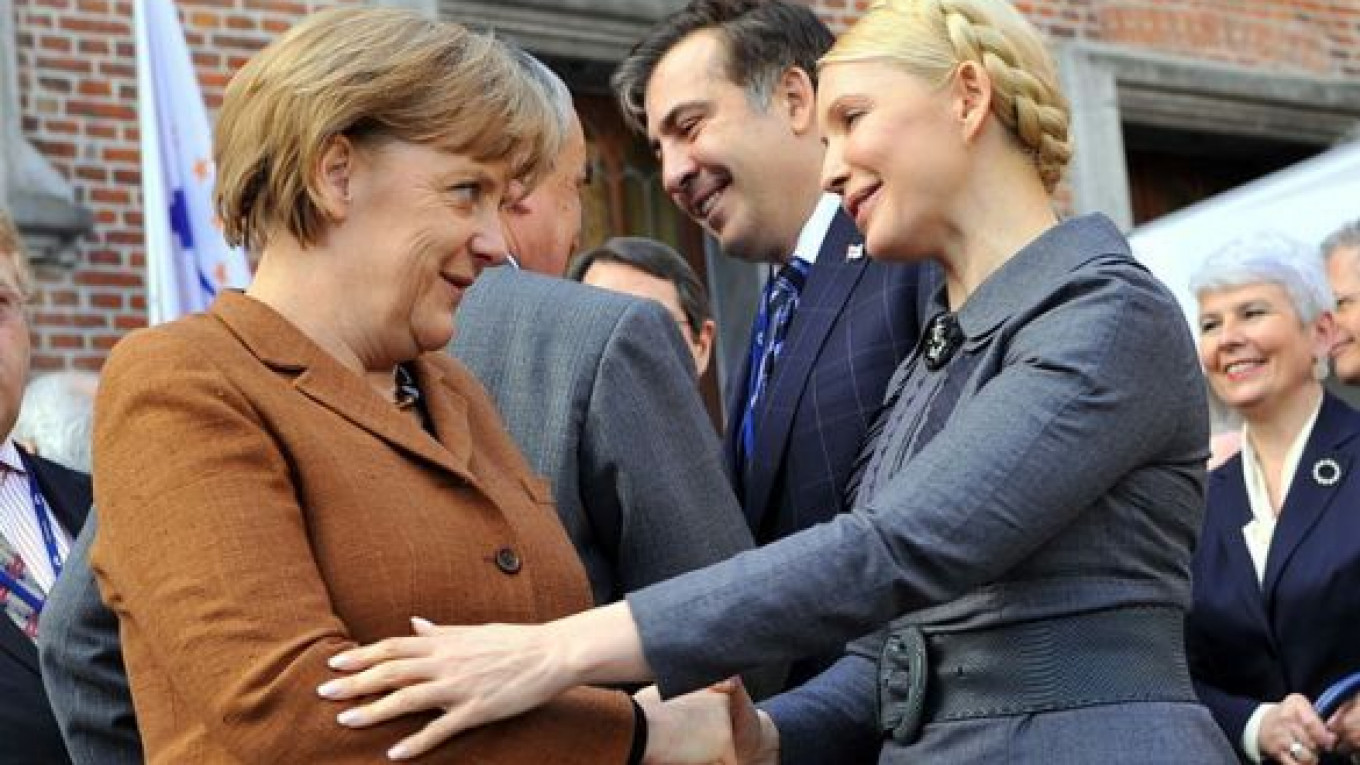BERLIN — German Chancellor Angela Merkel said Monday that Ukraine must take "credible steps" to clinch a trade agreement with the European Union, but also promised to counteract any retaliatory measures from Russia if Kiev did what was needed to secure a deal.
"I would like to make it clear again. We expect credible steps from Ukraine in fulfilling the criteria for a cooperation agreement," Merkel said in a speech in the Bundestag lower house of parliament. "We expect this process to be implemented sustainably and irreversibly."
With less than two weeks to go before the agreement is due to be signed at a summit in the Lithuanian capital Vilnius, the EU has made clear that Ukraine has not done enough to meet the conditions for a signing.
The main sticking point is Ukraine's jailing of former prime minister Yulia Tymoshenko, a fierce opponent of President Viktor Yanukovych. The EU, which sees Tymoshenko as the victim of a political trial, is pressing Yanukovych to end the standoff and free her to be able to go to Germany for medical treatment for back trouble.
Mentioning Tymoshenko by name, Merkel said the EU expected Ukraine to show movement on the issue of "selective justice." It must also modernize its election system and fulfill other criteria specific to the trade and cooperation deal, she said.
"We know that the decision to bind itself closer to the EU is not an easy one, neither for Ukraine nor for our partners. In the last months, some of them have exerted a huge amount of pressure," she said, mentioning Russia, which has tried to dissuade the former Soviet republic from signing the deal.
"I will push in Vilnius for the EU to counteract this pressure with concrete opportunities and real solidarity," Merkel added.
"This could be done by offering additional sales possibilities for products of our partner that cannot be exported to Russia, or through help in broadening its supplies of energy," Merkel said. "To be clear, countries decide alone about their future direction. No third party can have a veto.''
The Ukrainian parliament, dominated by Yanukovych's allies, has been deadlocked over agreeing a draft law to release Tymoshenko to go to Berlin for treatment. It holds a crunch session on the issue on Tuesday, though Yanukovych's supporters in parliament said Monday that no outline agreement had yet been reached to free her.
German Foreign Minister Guido Westerwelle said Monday in Brussels that he wanted Ukraine to look toward Europe and benefit from closer trade ties with the EU, but that it also had to meet basic requirements.
"I urgently recommend Ukraine to act … and not play for time. Time is running out," he told reporters as he arrived for an EU meeting that was due to discuss Ukraine.
Berlin's offer to allow Tymoshenko to come to Germany for medical treatment remained on the table, he said.
Lithuanian President Dalia Grybauskaite, whose country holds the EU presidency, said that for the agreement to be signed Ukraine must enact reforms on elections and the public prosecutor's office and resolve the Tymoshenko question.
"If this is not done, it will not be possible to sign the agreement," she told reporters in Vilnius.
A Message from The Moscow Times:
Dear readers,
We are facing unprecedented challenges. Russia's Prosecutor General's Office has designated The Moscow Times as an "undesirable" organization, criminalizing our work and putting our staff at risk of prosecution. This follows our earlier unjust labeling as a "foreign agent."
These actions are direct attempts to silence independent journalism in Russia. The authorities claim our work "discredits the decisions of the Russian leadership." We see things differently: we strive to provide accurate, unbiased reporting on Russia.
We, the journalists of The Moscow Times, refuse to be silenced. But to continue our work, we need your help.
Your support, no matter how small, makes a world of difference. If you can, please support us monthly starting from just $2. It's quick to set up, and every contribution makes a significant impact.
By supporting The Moscow Times, you're defending open, independent journalism in the face of repression. Thank you for standing with us.
Remind me later.






